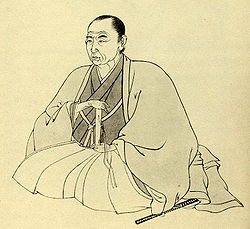- Motoori Ōhira
-
In this Japanese name, the family name is "Motoori".
Motoori Ōhira (本居 大平, March 17, 1756 - October 23, 1833) was a scholar of Kokugaku, and was the successor to Motoori Norinaga's school master.[1] His pen name was Fuji no Kakitsu (藤 垣内).
Life
Ōhira was born in Matsuzaka of the province of Ise (now Matsuzaka City in Mie prefecture). He was a son of Inagake Munetaka (稲懸 棟隆 or 稲掛 棟隆) who was a Merchant and Norinaga's pupil. Ōhira entered Norinaga's School by 13 years old, and became Norinaga's adopted son at the age of 44 years old. Motoori Norinaga was serving Wakayama Domain. However, Ōhira inherited a patrimony at Motoori house after the Norinaga's death, because Norinaga's first son, Motoori Haruniwa (本居 春庭) was blinded. In 1802, Wakayama Domain gave an order to Ōhira to work. After Ōhira was moved to Wakayama in 1809, Norinaga's school branched off Haruniwa's school in Matsuzaka and Ōhira's one in Wakayama.
Ōhira's character was gentle, his seigneur was deeply trusted in him. Ōhira taught seigneur about classical Japanese literature and edited "Ise Zoku Fudoki (伊勢続風土記)" that was chorography. He endeavored to succeed to Norinaga's Study and to lead the school. He had equal to or more than 1,000 pupils.
Works
Ōhira followed faithfully to Norinaga's thought and never invented new ideas himself.
- Kogaku no Kaname : Japananese name (古学要)
- Tamahoko Hyakusyu Kai : Japananese name (玉鉾百首解)
- Kagurauta Shinsyaku : Japananese name (神楽歌新釈)
- Yasoura no Tama : Japananese name (八十浦之玉)
- Inaba Syū : Japananese name (稲葉集) It is an anthology of Waka Poem.
References
- ^ Peter Francis Kornicki (2001). The Book in Japan: A Cultural History from the Beginnings to the Nineteenth Century. University of Hawaii Press. p. 217. ISBN 0824823370. http://books.google.ca/books?id=gAtWc9wCHhMC. Retrieved 2009-10-11.
Categories:- Kokugaku scholars
- People from Mie Prefecture
- People from Wakayama Prefecture
- 1833 deaths
- Japanese writers of the Edo period
Wikimedia Foundation. 2010.

